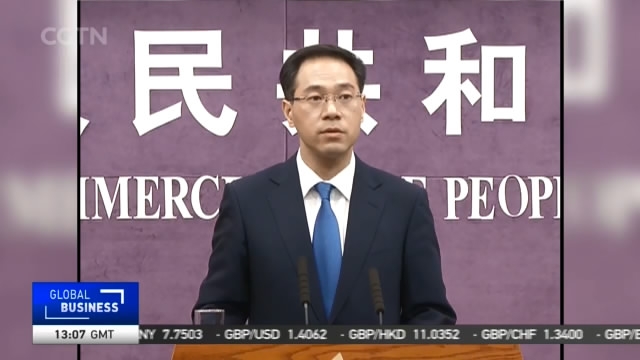
21:49, 02-Apr-2018
China-US Trade Frictions: Beijing raises tariffs on 128 kinds of American goods

China has slapped tariffs of up to 25 percent on 128 American products, including frozen pork, wine, and fruit. The decision, made by the Customs Tariff Commission of the State Council, takes effect Monday. Financial experts in China expressed that the ongoing trade frictions will harm trade relations in a profound way. CGTN's Meng Qingsheng reports.
In response to American tariffs on imported Chinese aluminum and steel, China has decided to impose a tariff of 15 percent on 120 US products, ranging from nuts to steel pipes. And a tariff of 25 percent on 8 other US products, including pork and scrap aluminum. Huo Jianguo says it's Beijing's lawful right to hit back.
HUO JIANGUO, VICE CHAIRMAN CHINA SOCIETY FOR WORLD TRADE ORGANIZATION STUDIES "I think the scope of tariffs is still limited. It fails to touch the main nerves of America, as most of the items are agricultural products from small-scale production. In fact, China imports nearly one-third of its soy beans, if China levies tariffs on imports of soy beans, that would give much pressure to the US government, and may affect the Republican's mid-term election."
Despite worldwide objections, the US decided in early March to impose a 25 percent tariff on steel imports, and a 10 percent tariff on aluminum. The measure went into effect on March 23rd. The Chinese government says the move violates World Trade Organization rules, and causes serious damage to its interests.
MENG QINGSHENG BEIJING "The Ministry of Finance says China supports a multilateral trade system. The suspension of tariff concessions is meant to balance the losses caused by US actions, and to safeguard China's interests using WTO rules."
In specific terms, China's Commerce Ministry says the American tariffs have abused the security exception clause of the WTO. It urges Washington to end the tariffs and restore normal bilateral trade relations. Huo suggests to resolve tensions, the US should adjust its domestic policies.
HUO JIANGUO, VICE CHAIRMAN CHINA SOCIETY FOR WORLD TRADE ORGANIZATION STUDIES "I think the best way to solve the tension is to sign a free trade agreement so that both China and the US take an open-minded approach to promote trade and investment. Based on previous experience, there are three effective ways to achieve this goal, to expand imports, increase investment, and regulate the amount of exports."
Experts believe that it's impossible for China and the US to root out all the factors leading up to the imbalanced trade pattern. But it is possible to take concrete measures to prevent it from going in the wrong direction. Meng Qingsheng, CGTN, Beijing.

SITEMAP
Copyright © 2018 CGTN. Beijing ICP prepared NO.16065310-3
Copyright © 2018 CGTN. Beijing ICP prepared NO.16065310-3